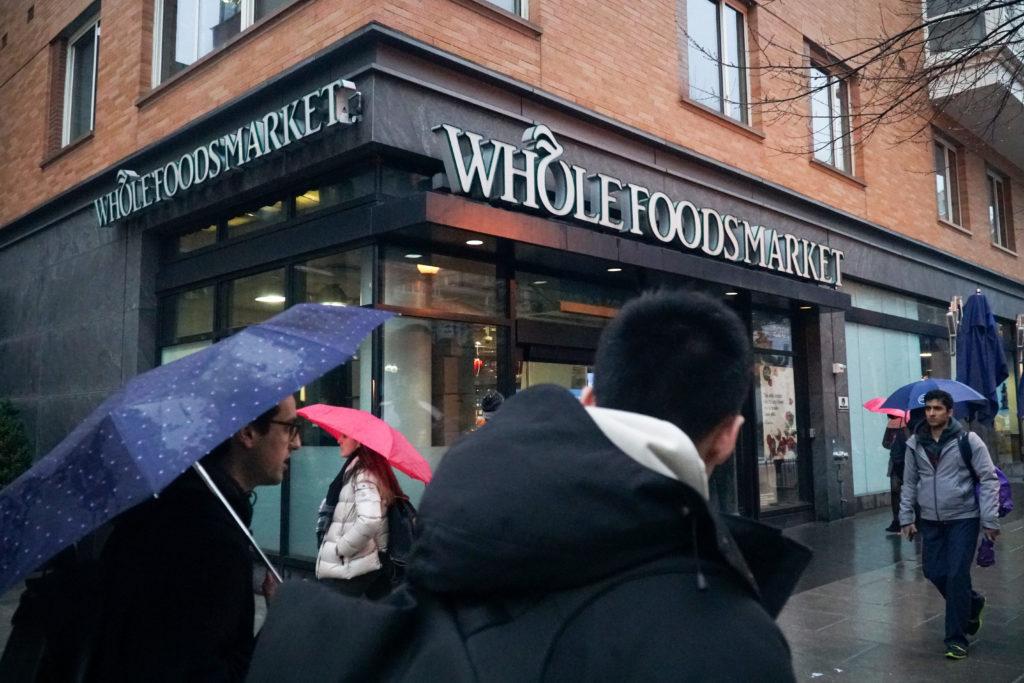Students said there is a lack of adequate dining and grocery options on campus as they prepare for Whole Foods to stop accepting GWorld as a form of payment next month.
A Whole Foods Market spokesperson said in an email last week that May 31 is the last day the Foggy Bottom Whole Foods will accept GWorld payments. Whole Foods’ phasing out of GWorld comes after the grocery store giant announced last April that all stores would end partnerships with university dining plans around the country and after the University switched to a swipe-based dining system in January, phasing out the declining GWorld balance system students could use to purchase groceries and dine at restaurants.
The Foggy Bottom Whole Foods opened in September 2011 and began accepting GWorld the same month. A Whole Foods spokesperson declined to comment on what other university dining plans it was phasing out and how the chains anticipate the end of their participation in university dining plans will affect their business.
University spokesperson Julia Metjian said the University will add a grocery-style market to District House this summer to ensure grocery items will still be available on the “dining program.” She declined to comment on whether officials would change the weekly shuttle to Safeway on 1855 Wisconsin Ave. NW in Georgetown — the only other major grocery store that accepts GWorld, roughly 20 minutes from campus by bus — which officials launched in December.
“We are consistently working with potential partners to offer more grocery options for students,” Metjian said.
More than 20 students said they plan to continue grocery shopping next year despite the Whole Foods GWorld phase out, opting to use their own money at stores like Whole Foods and Trader Joe’s. Some students said the University should work to partner with another grocery store closer to campus like Trader Joe’s, noting the need to travel to Safeway by bus or shuttle.
The West End Trader Joe’s has not accepted GWorld since its opening in 2006, even after the University contacted them about partnering that year. Trader Joe’s did not return a request for comment last week regarding whether they have considered partnering with GWorld.
Safeway did not return a request last week for comment on whether it plans on making any changes to its GWorld system or whether it anticipates any changes in its business after Whole Foods stops accepting GWorld. The Safeway on MacArthur Boulevard, a 10 minute walk from the Mount Vernon campus, accepted GWorld but closed in 2019.
Emma Walther, a sophomore majoring in international affairs, said it is “disappointing” that Whole Foods will go off GWorld because Whole Foods is the “biggest way” many students buy groceries and essential for those who wish to make food that reminds them of home and their culture.
“Being able to cook your own food is something that a lot of college students value, as we’re so far away from home,” Walther said. “I know, personally, I’m from across the country, so being able to cook food that I grew up eating or that I’m used to cooking is something that I will miss with Whole Foods leaving GWorld.”
Charlie Kaltenbach, a sophomore studying cognitive science and language, said Whole Foods going off GWorld is “frustrating” because it renders the kitchens in residence halls “mostly useless.” She said she plans to continue purchasing basics from Whole Foods because taking the bus to Safeway is inconvenient.
“I think the dorms are very expensive in part because of the kitchens and not being able to stock them with anything is frustrating,” she said.
The University opened all-you-can-eat dining halls in Thurston and Shenkman halls in the fall and spring, respectively, requiring freshmen to purchase swipe-based plans to use at the new dining halls in the spring semester. The University will require all on-campus students purchase meal plans for next semester, ranging from 90 swipes and $890 in DC Dining Dollars to unlimited meal swipes and $200 of DC Dining Dollars funds for groceries or meals at partnering restaurants.
Cecily Phua, a sophomore studying biology and music, said the dining halls may serve as an adequate substitute for grocery shopping at Whole Foods once it goes off GWorld for students who formerly struggled to budget their GWorld because the dining halls provide a consistent dining option for students. But she said she cannot use her remaining GWorld balance to pay for groceries, which she has prepared and cooked in her dorm previously, next year with Whole Foods going off GWorld.
“I’m also paying for a dorm with a kitchen, just to be de-incentivized to use the kitchen,” she said.
Clare Trainor, a freshman studying chemistry, said she would prefer the University put the West End Trader Joe’s on GWorld over Whole Foods remaining on GWorld because Trader Joe’s is a cheaper option than Whole Foods. She said she likes to grocery shop and cook her own meals on her own schedule as opposed to going to dining halls at set times.
She said the next nearest option for groceries on GWorld is CVS, which has fewer items.
“I like cooking my own food because I like knowing what I put in it, and I like knowing the ingredients to make it to how I like my taste,” she said. “And I can’t do that at the dining hall.”








